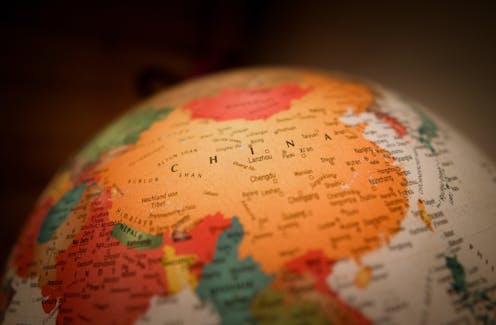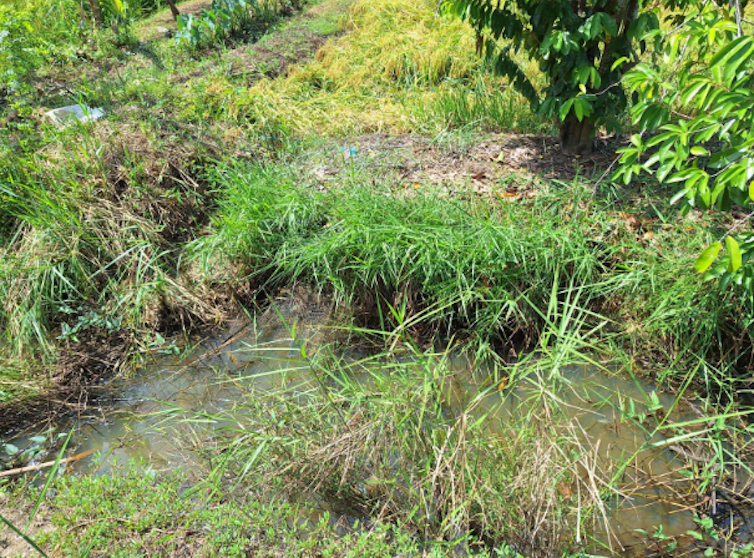China has a new global development initiative, but who will actually benefit from it?
- Written by Amitrajeet A. Batabyal, Distinguished Professor and Arthur J. Gosnell Professor of Economics, Rochester Institute of Technology

China’s well-publicized Belt and Road Initiative to invest in infrastructure projects in other countries has helped it expand its political influence around the world. But a newer, lesser-known development program has launched with apparently similar objectives.
There is no question that China is a major player in world affairs, representing the second-largest economy in the world[1] after the United States. In his role as a world leader, China’s President Xi Jinping[2] periodically announces global projects designed to promote China on the world stage and to demonstrate global influence.
A year after assuming power in 2012 he announced the creation of the so-called Belt and Road Initiative[3], a massive infrastructure project designed to increase investment and promote economic development in many of the world’s poor nations.
The resulting bridges, ports and roads built in developing nations throughout the world have cost hundreds of billions of dollars[4], and questions have been raised about whether they are harming nature[5]. By accepting Chinese loans with stringent conditions[6], developing nations with weak bargaining power[7] and limited options for raising funds externally carried a large part of these costs.
In addition to this infrastructure objective, the Belt and Road Initiative was a push for China to gain more economic and political power[8]. Many developing nations that took loans from China[9] are finding it difficult to repay[10] them while fighting COVID-19 and dealing with faltering economies[11].
As poor nations have become more financially dependent, China has attempted to expand its influence at a global scale[14]. This state of affairs has led to criticism[15] of the Belt and Road Initiative by the U.S. and its allies.
In the past year, Xi has advanced another idea – the Global Development Initiative[16].
China’s global plan
Xi proposed the Global Development Initiative at the opening of the 76th session[17] of the U.N. General Assembly in September 2021. Although this initiative is described as “improving the process of global development[18],” its two stated and most important goals are to help the U.N. achieve its 2030 agenda for sustainable development[19] and to help all nations, particularly developing countries, respond effectively to the shock caused by COVID-19 with a focus on “greener and healthier global development[20].”
Xi states that China would like to concentrate on “people-centered development[21]” by helping poor nations recover in the post-pandemic era and by strengthening international development cooperation[22]. More than 100 nations[23] support the Global Development Initiative. My research[24] in international economics with an emphasis on China shows that Beijing has other goals as well, both developmental and political. These political goals might be problematic for many nations in the world that would like to pursue independent policies.
Three GDI questions
First, the Global Development Initiative thus far has been couched in generalities[27]. It is, so far, unclear in what ways China will help other nations, and how much money it will spend.
Second, Western concepts of economic development place considerable emphasis on freedom and human rights. China talks about freedom and human rights but emphasizes the “right to subsistence[28]” or the right to food and clothing[29], as the most salient human right. All other rights are secondary.
Focusing primarily on economic subsistence – and, by extension, economic betterment – does not guarantee, for instance, the right to free speech or the right to vote. So, it is unclear whether Zhang Jun, the Chinese ambassador to the U.N., is correct when he says that the Global Development Initiative “will surely make an important contribution[30] to the international human rights cause.”
Third, the fact that the development initiative is not solely about development is clear from its connection[31] to another of Xi’s new projects, announced in April 2022 at the Boao Forum for Asia, which promotes economic integration. This project, named the Global Security Initiative[32], seeks to challenge the U.S. Indo-Pacific strategy[33] and to question “Cold War mentality[34]” that would “exacerbate security challenges[35]” in the 21st century. Global development and security initiatives are linked because Xi has explicitly stated that security is a precondition for development[36].
The threat of war
The Global Security Initiative represents, in part, Beijing’s response to Russia’s war with Ukraine. Xi stated that security was a precondition for development[37] and that nations ought to respect the legitimate security concerns of all nations[38]. In a counterpoint to NATO and the actions of the U.S.-led alliance among Western nations, Xi also pointed out that nations ought to reject the Cold War mentality[39] and oppose the wanton use of unilateral sanctions and long-arm jurisdiction[40].
Taken together, it is not clear whether China is truly interested in promoting global development, in increasing security and human rights for all people, or in replacing the U.S.-led world order by proposing development initiatives without specifics or accountability. It will be important to look not only at what China says it wants to do on the world stage but at what it actually does.
References
- ^ representing the second-largest economy in the world (www.bbc.com)
- ^ Xi Jinping (www.britannica.com)
- ^ Belt and Road Initiative (www.cfr.org)
- ^ hundreds of billions of dollars (knowledge.wharton.upenn.edu)
- ^ they are harming nature (theconversation.com)
- ^ stringent conditions (www.ft.com)
- ^ weak bargaining power (www.bbc.com)
- ^ more economic and political power (theconversation.com)
- ^ took loans from China (www.asianews.it)
- ^ difficult to repay (www.bbc.com)
- ^ faltering economies (blogs.imf.org)
- ^ Photo by Ken Lawrence on Unsplash. (unsplash.com)
- ^ CC BY (creativecommons.org)
- ^ influence at a global scale (www.brookings.edu)
- ^ criticism (www.csis.org)
- ^ Global Development Initiative (www.gmfus.org)
- ^ 76th session (www.globaltimes.cn)
- ^ process of global development (borgenproject.org)
- ^ 2030 agenda for sustainable development (www.un.org)
- ^ greener and healthier global development (www.fmprc.gov.cn)
- ^ people-centered development (global.chinadaily.com.cn)
- ^ international development cooperation (asianews.network)
- ^ 100 nations (news.cgtn.com)
- ^ My research (scholar.google.com)
- ^ Photo by Alejandro Luengo for Unsplash (unsplash.com)
- ^ CC BY (creativecommons.org)
- ^ couched in generalities (www.economist.com)
- ^ right to subsistence (www.google.com)
- ^ food and clothing (www.fmprc.gov.cn)
- ^ important contribution (www.fmprc.gov.cn)
- ^ its connection (www.sunnewsonline.com)
- ^ Global Security Initiative (www.business-standard.com)
- ^ Indo-Pacific strategy (www.whitehouse.gov)
- ^ Cold War mentality (thediplomat.com)
- ^ exacerbate security challenges (thediplomat.com)
- ^ security is a precondition for development (www.brixsweden.org)
- ^ precondition for development (www.brixsweden.org)
- ^ legitimate security concerns of all nations (www.brixsweden.org)
- ^ reject the Cold War mentality (www.brixsweden.org)
- ^ long-arm jurisdiction (www.brixsweden.org)
Authors: Amitrajeet A. Batabyal, Distinguished Professor and Arthur J. Gosnell Professor of Economics, Rochester Institute of Technology





